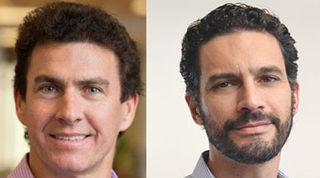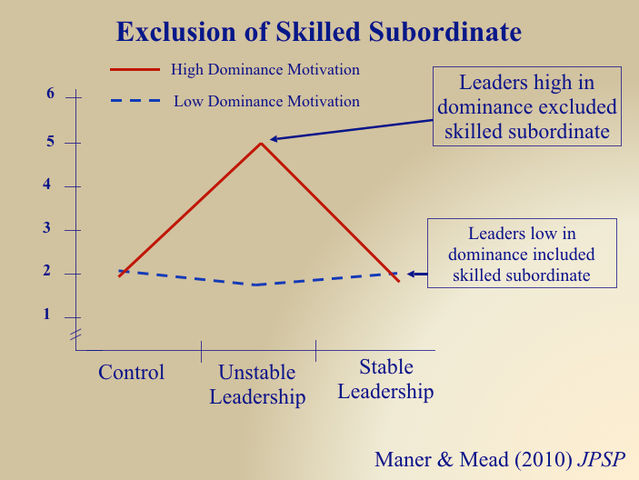Leadership
What Kind of a Leader Are You?
The pros and cons of dominance versus prestige
Posted June 11, 2016
Throughout most of the animal kingdom, leadership is based on size and power: The leader of a group of chimpanzees is simply a big bully, who threatens the other group members into submission. Some human leaders, such as Libya’s Muammar Gaddafi, Uganda’s Idi Amin, and Russia’s Joseph Stalin, have tended to follow this model as well.

But in a classic paper, Joe Henrich and Francisco Gil-White argued that in human beings, there is a second basis of social status – one based on a person’s ability to provide useful information to the group, and not upon force and threat.
Jon Maner is a professor at Northwestern’s Kellogg School of Management and Organizations. Along with his doctoral students Charleen Case and Nicole Mead, Maner has been studying how this distinction plays out in human groups.
According to Maner:
“There are two basic styles of leadership. One, that we call dominance, is psychologically ancient, and it’s something that we share with lots of other non-human primates, like chimpanzees. Dominance is all about leading through coercion, intimidation, and manipulation of reward and punishment. It’s kind of like the Steve Jobs style of leadership: you get people to do what you want, because they’re afraid of you.
“The second style of leadership is what we call prestige. Prestige is all about being admired, and respected, leading from behind, getting people to do what you need them to do not because you’re forcing them to, but because they respect you and see you as a role model. People get prestige by displaying valuable knowledge, skill, and talent, by being a useful member of the group. And when people see somebody acting like that, they often look up to that person, really respect them, admire them, and treat them as a role model… a good example of a prestige-oriented leader is somebody like Nelson Mandela.”
During my recent visit to Northwestern University, Maner described a fascinating series of studies that he, Case, and Mead have been doing on dominance-oriented versus prestige-oriented leaders.
Dominance-oriented leaders prioritize their power over the good of the group
“In our research, we bring people into the lab and put them into groups, and we’ll randomly assign one person to be the leader. We evaluate whether that person adopts either a dominance approach to leadership, or a prestige based approach to leadership based on some questionnaires that we give them.”
“What we found across lots of studies,” Maner explained, “is that when push comes to shove, dominant leaders are more inclined to selfishly prioritize their own capacity for power over the good of the group. So, for example, dominant leaders often see other talented group members as threats, as competitors, as people who might end up outshining them. In one study, we told leaders that there is one member of the group who is really really good at this task; they’re really skilled. And we asked the question: Is the leader going to give this person more responsibility, to treat them as a role model for other group members, or might they instead see this person as a threat, and actually try to kick them out of the group. Whereas prestige-oriented leaders give this very talented group member more responsibility and treat them as a role model, dominance-oriented leaders actually try to ostracize them and kick them out of the group.”
Dominance-oriented leaders keep tight control over information

In another set of studies, the research team investigated the extent to which different kinds of leaders would share information with other group members. Leaders are often privy to lots of information because of their leadership role. And they often have to make choices about what information to share, and what information to keep to themselves. Maner noted that freely sharing information tends to be good for the group, and to enhance group productivity. He and his colleagues did find that prestige-oriented leaders did shared information very freely with other members of the group. But dominance-oriented leaders tended to hoard information. They were afraid that sharing too much information would potentially give other group members chance to outshine them, and potentially take over their power and their leadership role.
Maner noted that a good historical example of this was Josef Stalin, who during the great purge actually either ostracized or killed all of his top leadership, mainly because he was afraid that at some point in the near future, one or more of them was going to try to take over his power.
In another series of studies, the researchers asked whether different types of leaders would try to foster communication among group members versus block communication among group members. Other research indicates that sharing information tends to boost group performance. “But when your group starts communicating that can lead them to form alliances and friendships, and that could be perceived as a threat by the leader because you don’t want people ganging up against you.” Maner explained, “So if you’re insecure, you worry a lot about people potentially ganging up. What we find in several studies is this: Whereas prestige oriented leaders tend to foster and encourage communication among group members, dominance-oriented leaders really take more of a divide-and-conquer strategy where they prevent group members from talking with one another. So they’ll actually physically separate them by putting them in different rooms, and they’ll also psychologically separate them by preventing them from communicating in a close interpersonal way.”
Dominance-oriented leaders undermine strong alliances and independent decision-making among followers
Amongst chimpanzees, the alpha male will often charge at the beta and gamma males (numbers two and three in the group) if he sees them grooming one another and appearing to be forming a strong alliance.
Amongst humans, dominance-oriented leaders prevent group members from forming strong alliances by assigning them to groups where they won’t necessarily be perfectly compatible with the others.
Like chimpanzees, dominance-oriented human leaders also use various forms of intimidation to control or coerce their subordinates. As Maner noted: “One way to intimidate people is by getting really close them, and looking over their shoulder. In one study, we randomly assigned some participants to be leader over a partner, and we asked the leader to position two chairs, side-by-side at a work station where they would be doing a dyadic task. We found that dominant leaders, but not prestige oriented leaders, sat their chair really close by this other person, so that they could essentially look over their shoulder and make sure they weren’t doing anything the leader didn’t approve of.”

Maner and his colleagues find that these negative behaviors are enhanced when dominant leaders are insecure about their leadership, and reduced when their high status position is secure.
Are there any negative sides to having a prestige-oriented leader?

University of Illinois psychologist Joey Cheng and her colleagues found that whereas prestige-based leaders are well-liked, dominance-oriented leaders are not very popular. In most cases, prestige-oriented leaders deserve their popularity, their approach is generally good for groups, helping groups innovate and come up with creative decisions.
But there are some pitfalls to being a prestige-oriented leader. For example, prestige oriented leaders really enjoy being liked and respected by the group, which can lead them to have trouble giving negative feedback. Prestigious leaders often hem and haw when they have to deliver negative feedback, and pull their punches. Thus, they don’t really give feedback that’s perfectly accurate, but sugar-coat the feedback so they end up not being disliked. Dominance-oriented leaders, on the other hand, like one of the current candidates for U.S. President, are happy to get in a subordinate’s face, say: “You’re fired!”
Another problem with prestige-oriented leaders is that they sometimes make decisions that are popular even if those aren’t necessarily the best decisions. In one series of studies, Maner and his colleagues assigned one participant to be the leader of the group, and tell him or her: “There are essentially two decisions you can make in this situation. You can make Decision A, which we know objectively is the best decision, but we also know that most members of your group tend to prefer Decision B.”
What the researchers found is that prestige-oriented leaders often choose Decision B, the one that’s popular, even though it’s objectively a worse decision.
As we approach the presidential election, it is interesting to consider how these two styles of leadership apply to the two presumptive presidential nominees.
Douglas Kenrick is author of The Rational Animal: How evolution made us smarter than we think and Sex, Murder, and the Meaning of Life: A psychologist investigates how evolution, cognition, and complexity are revolutionizing our view of human nature.
Related blogs
A great way to reduce your job satisfaction!
The 6 principles of persuasion.
What is the intellectual elite worth to the American economy?
References:
Case, C. R. & Maner, J. K. (2014). Divide and conquer: When and why leaders undermine the cohesive fabric of their group. Journal of Personality and Social Psychology, 107, 1033-1050.
Cheng, J. T., Tracy, J. L., Foulsham, T., Kingstone, A., & Henrich, J. (2013). Two ways to the top: Evidence that dominance and prestige are distinct yet viable avenues to social rank and influence. Journal of Personality and Social Psychology, 104(1), 103.
Henrich, J., & Gil-White, F. J. (2001). The evolution of prestige: Freely conferred deference as a mechanism for enhancing the benefits of cultural transmission. Evolution and human behavior, 22(3), 165-196.
Mead, N. L. & Maner, J. K. (2012). On keeping your enemies close: Powerful leaders seek proximity to ingroup power-threats. Journal of Personality and Social Psychology, 102, 576-591.
Maner, J. K., & Mead, N. (2010). The essential tension between leadership and power: When leaders sacrifice group goals for the sake of self-interest. Journal of Personality and Social Psychology, 99, 482-497.
Photo credits
Gil White photo:
Nelson Mandela: Limkowing University: https://www.limkokwing.net/malaysia/special_features/mandela
Idi Amin: http://www.biography.com/people/idi-amin-9183487
Joe Henrich: Dept of Human Evolutionary Biology, Harvard University; http://heb.fas.harvard.edu/people/joseph-henrich
Joey Cheng: Dept. of Psychology, University of Illinois; http://www.psychology.illinois.edu/people/jtcheng
Jon Maner: Florida State psychology professor wins prestigious early career award.
http://news.fsu.edu/More-FSU-News/24-7-News-Archive/2013/February/Psych…




